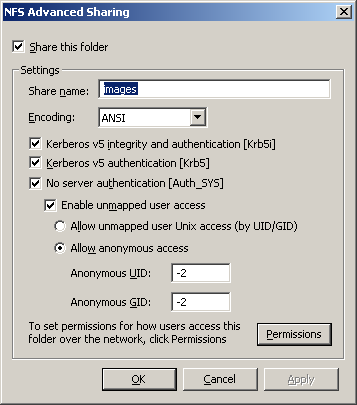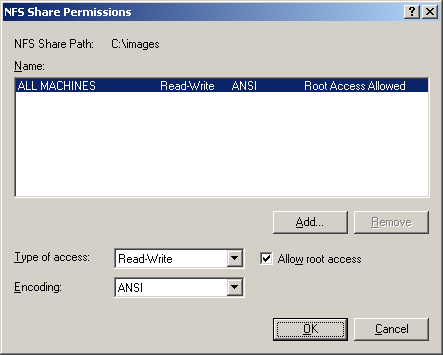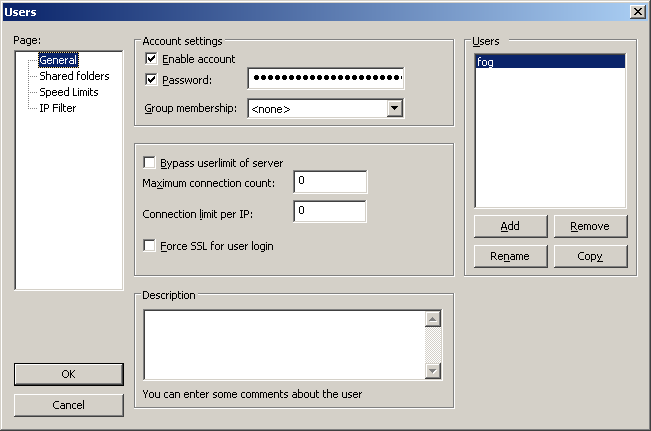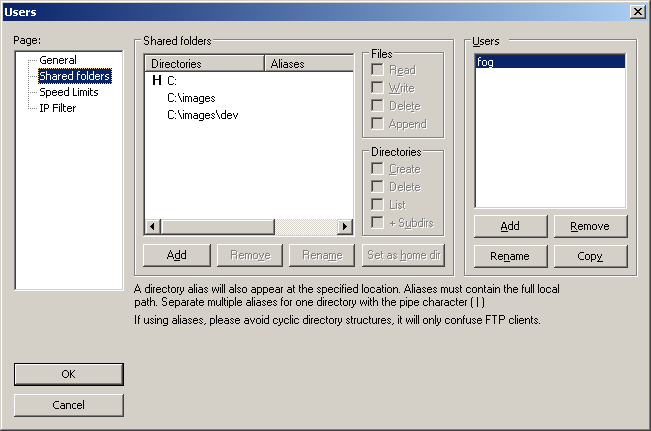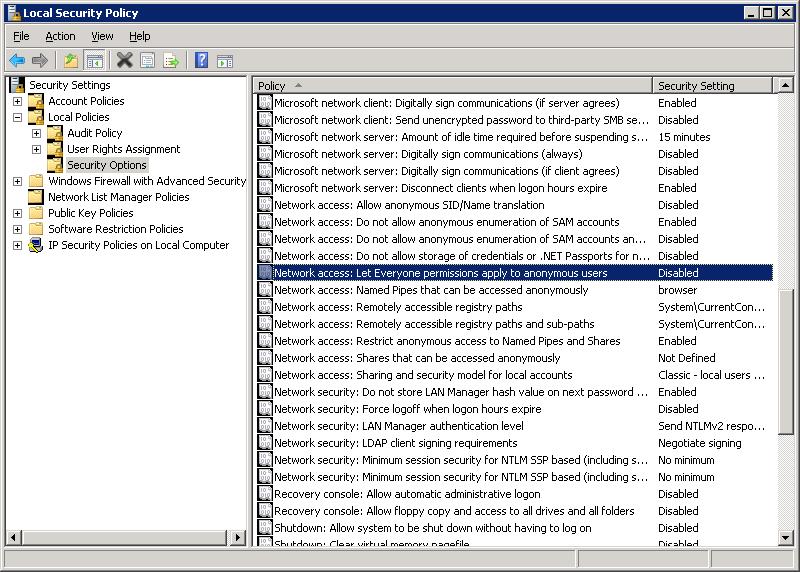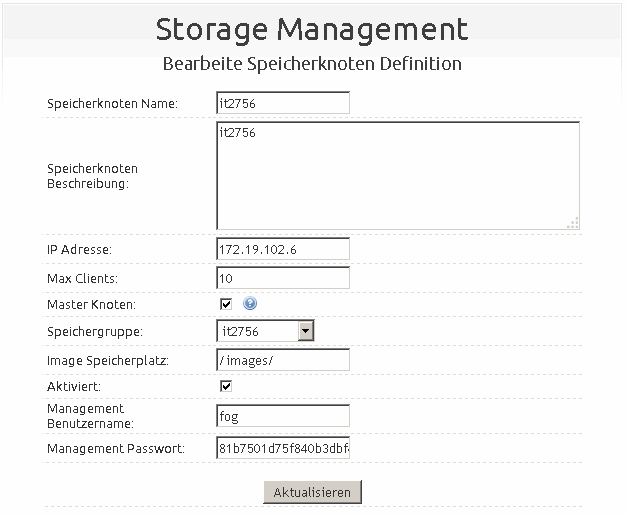Windows Storage Node
Contents
Windows Storage Node
- This is for STORAGE NODES ONLY you will still need a Linux install running as the main server. However, this will be part of the building blocks for a windows server build that yet does not exist.
- You may have a Windows Storage Node in combination with any number of Linux Storage Nodes or just a single Windows Storage Node.
- This has been put together from the forum and should be useful to many. Windows Server NFS
Requirements
- Windows Server 2008 (R2)/Windows Server 2012 (R2)
- NFS Role Installed (NFS)
- Filezilla Installed (FTP)
Windows Step-by-Step
Folder Creation & Setup
- Create folders
- Create folder C:\images
- Create folder C:\images\dev
- Set Sharing (you may not have kerberos enable do not worry about this)
- Set Permissions: Set proper permissions for All Machines
- Set Security: Make sure you do this for C:\, C:\images, and C:\images\dev
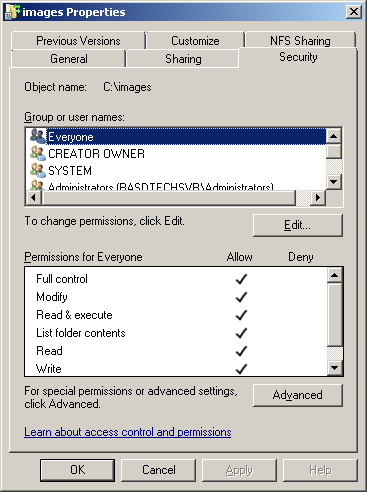
|
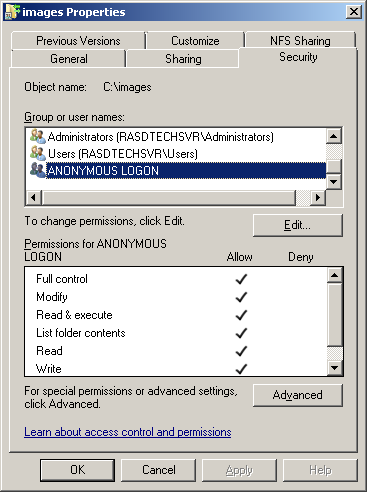
|
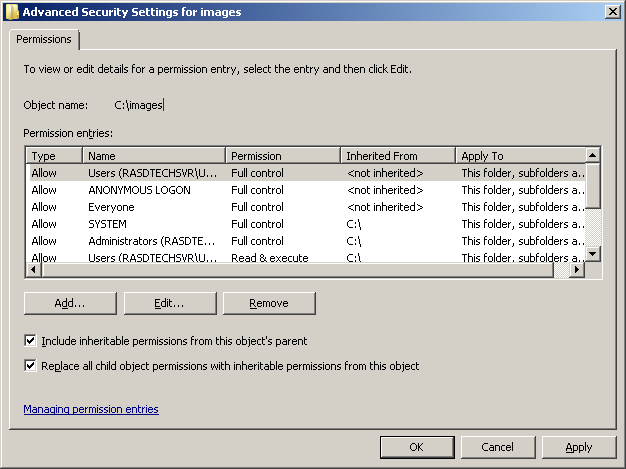
|
Filezilla Setup (FTP)
- Setup Filezilla Account: Create fog account and make sure this is the same password for your Management password
- Setup Filezilla Folders: Make sure these files $ Directories all have Read, write, delete, append rights
Windows Policies
- Set Local Policies: Set this policy to Enabled
NFS
- Configure NFS Server: Stop NFS Server Service, Edit Transport Protocol to TCP+UDP, and Start NFS Server Service
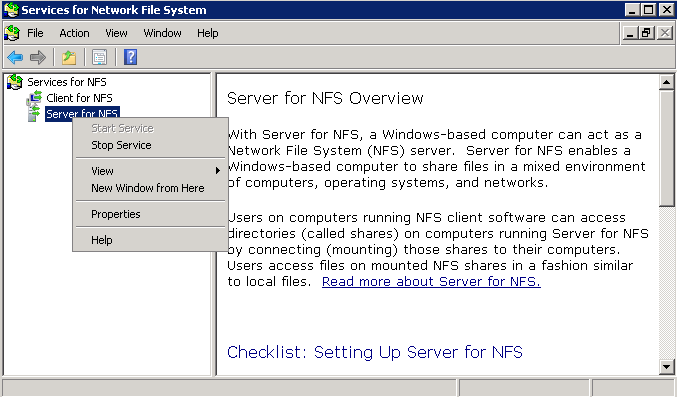
|
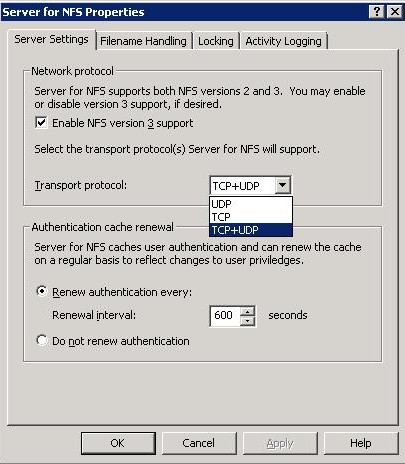
|
Fog Server
- Here is the tricky part.....You need to copy the hidden files on your Linux server to your windows server. These files are located @:
- /images/.mntcheck --> c:\images\
- /images/dev/.mntcheck --> c:\images\dev\
- xxx.xxx.xxx.xxx ==> ip address of the windows server
- I mounted the NFS drive and just did a cp command.
- Using terminal or ssh remote:
cd / sudo mkdir images2 sudo chmod 777 images2 sudo mount xxx.xxx.xxx.xxx:/images /images2 sudo cp /images/.mntcheck /images2 sudo cp /images/dev/.mntcheck /images2/dev/ sudo umount /images2
Fog Web GUI
- Then continue by adding a storage node just as you would in the wiki.
- I Simply added a Storage Node Definition in its own Storage Group independent to the default storage Group, added it's IP 172.19.102.6 and the path /images/ because it's the path 172.19.102.6 exports also /images/dev/ like an original FOG node does.
Glitches
- At times NFS does not want to replicate (minimally after restarts) so need of restarting the NFS service is required.
- Windows Nodes will not report any information in the Dashboard
 . This means no bandwidth and no disk information.
. This means no bandwidth and no disk information.
- The only really way to know if it is working is to check the Image Replicator log. It will show something like:
[01-20-15 8:25:38 am] * [Windows_Node_Name] - SubProcess -> Mirroring directory `[Image1]' [01-20-15 8:25:38 am] * [Windows_Node_Name] - SubProcess -> Mirroring directory `[Image2]' [01-20-15 8:25:38 am] * [Windows_Node_Name] - SubProcess -> Mirroring directory `[Image3]' [01-20-15 8:25:38 am] * [Windows_Node_Name] - SubProcess -> Mirroring directory `[Image4]' [01-20-15 8:25:38 am] * [Windows_Node_Name] - SubProcess -> Mirroring directory `[Image5]' [01-20-15 8:25:38 am] * [Windows_Node_Name] - SubProcess -> Mirroring directory `[Image6]' [01-20-15 8:25:38 am] * [Windows_Node_Name] - SubProcess -> Mirroring directory `[Image7]' [01-20-15 8:25:38 am] * [Windows_Node_Name] - SubProcess -> Mirroring directory `postdownloadscripts' [01-20-15 8:25:38 am] * [Windows_Node_Name] - SubProcess -> Complete
- If having issues PM Wolfbane8653 in the forum.
- This is an interesting thread to me as it shows the flexibility of FOG. While cumbersome, it CAN be "ported" to run on nearly any OS. ~ Tom Elliott Senior Developer
--Wolfbane8653.3362 (talk) 18:51, 16 June 2014 (CDT)
